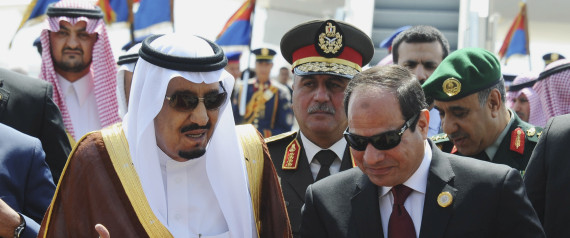 The
Arab heads of state have claimed Saturday at the opening of their
annual summit they were working to create a united force to fight
"terrorist groups" in the region, considering it a "test" the military
operation Joint underway in Yemen.
The
Arab heads of state have claimed Saturday at the opening of their
annual summit they were working to create a united force to fight
"terrorist groups" in the region, considering it a "test" the military
operation Joint underway in Yemen.For several weeks, in unison with the pan-Arab organization that placed him at the top of its agenda for the summit, Egyptian President Abdel Fattah al-Sissi demanded with more insistence that Arab force to fight against groups "terrorists". In particular the organization Islamic state (EI), which multiplies the atrocities in Iraq and Syria and gaining ground in Libya and Egypt.
But more than the Sunni extremist group, the fear of the great Iranian Shiite rival, the mainstay of the Yemeni Houthi militia, expand its influence in the region that appears to require the Arab countries to overcome their differences. And endorse in the resort of Sharm el-Sheikh in Sinai, the creation of a joint military force.
Ryad led by a coalition involving nine Arab countries including Egypt, Thursday launched air strikes in Yemen to halt the advance of the Houthis who are trying to take over the whole country.
Beji Caid Essebsi in favor of an Arab solution to the crisis in Yemen
Arrived Friday mid-afternoon in Sharm el-Sheikh, President of the Republic Beji Caid Essebsi pleaded Saturday for an Arab solution to the crisis in Yemen, far from any foreign interference.
"We need more than ever to strengthen our solidarity and strengthen our ranks, through the exploitation of all available resources and the mobilization of all energies to ensure the development of Arab countries and addressing the socio-economic challenges they face, "said Caid Essebsi.
In addition, the Head of State reaffirmed the commitment of Tunisia to a peaceful resolution of the Libyan crisis, expressing the commitment of Tunisia to support the Libyan people, through the mechanism of the neighborhood countries.
Unprecedented threats'
At the opening of the summit, which is to last two days, Mr. Sissi, who chairs for one year the Arab League, claimed he had to speed up the formation of an Arab force "to deal with unprecedented threats to Arab identity "as is" terrorist groups "and the proliferation of conflicts.
Before the summit, Egypt had mentioned the possibility of sending in Yemen ground troops if necessary.
King Salman bin Abdul Aziz of Saudi Arabia has followed suit by building on the example of the joint military intervention that his country runs in Yemen, assuring that it would last until the restoration of security in the countries.
Yemen's President Abd Rabbo Mansour Hadi believed him that the air operation should continue until the "surrender" of the latter. But it must also be a "practice test" for future Arab force, he insisted.
The Sharm el-Sheikh then holds that several countries in the region are ravaged by conflicts, mainly Yemen, Syria, Libya and Iraq, but also face the threat of EI.
Heads of state should therefore adopt an Egyptian draft resolution already approved by Arab foreign ministers on Thursday indicating that the force, consisting of troops from member states is to implement "quick military action" to deal with security threats .
Egypt's army-which has the largest and among the best equipped in the world arabe- appears as the spearhead of this force when its air force and navy are involved in the intervention in Yemen.
The Secretary General of the UN Ban Ki-moon also attended the summit, called for a resolution "peaceful" the conflict in Yemen and has also expressed his "shame" to the "collective failure of the international and regional communities end the bloodshed in Syria. "
The Emir of Kuwait, Jordan and Bahrain kings, the president of Tunisia and President of the Palestinian Authority, the head of the Libyan Parliament recognized by the international community, also attended the summit under high security.
Police patrols and army were deployed in the streets, while military aircraft flew over the resort.
Iran Ryad priority
For Guidere, Arabic professor of geopolitics at the University of Toulouse (France), the operation in Yemen is "a trial run for future Arab rapid reaction force."
But differences of views among the 22 members of the League could slow the process.
"It is important that this force has specific objectives and a plan and a clear program," warns a Yemeni diplomat speaking on condition of anonymity.
Oraib al-Rentawi, director of Al-Quds Center for Political Studies, believes that if the Riyadh priority is to "deal with the growing influence of Iran in the region," Egypt and Jordan want However "the fight against terrorism."
"For now, the IE is secondary face the threat of extension of Shiite power in Yemen, which may profoundly alter the geopolitics of the region," said Mr. Guidère.
No comments:
Post a Comment